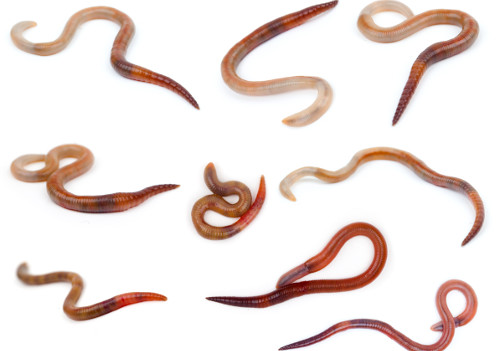Red Wiggler Worms - Effective Decomposers for Your Garden Compost Container
Red Wiggler Worms - Effective Decomposers for Your Garden Compost Container
Blog Article
Red Wiggler Worms Demystified: Unlocking the Secrets of Vermiculture for Greener Living and Nutrient-Rich Dirt
In the world of sustainable practices for enhancing soil high quality and advertising eco-conscious living, red wiggler worms play an essential yet commonly ignored role. Red Wiggler Worms. Recognizing the complexities of caring for these worms, maximizing their environment, and utilizing their castings can lead to a greener lifestyle and healthier dirt for plants to thrive.
The Function of Red Wiggler Worms
Red Wiggler worms play an essential role in composting systems by efficiently damaging down raw material right into nutrient-rich spreadings. These starved eaters eat a selection of organic materials, such as cooking area scraps, yard waste, and paper items. As they feed, the worms' gastrointestinal procedures break down the raw material into a fine, dark, and nutrient-dense material called worm spreadings or vermicompost.
The spreadings created by Red Wiggler worms are extremely helpful for soil health and wellness and plant growth. They are rich in essential nutrients like nitrogen, phosphorus, and potassium, which are crucial for sustaining healthy and balanced plant growth. Additionally, worm castings include helpful germs and enzymes that aid improve soil structure, increase water retention, and improve nutrient uptake by plants.
Benefits of Vermicomposting

Moreover, vermicompost, the nutrient-rich end product of vermicomposting, functions as a superb organic plant food and dirt conditioner. It enhances dirt framework, enhances dirt aeration, and raises soil dampness retention. These properties add to healthier plants with stronger origin systems and better resistance to conditions and insects. Vermicompost also enhances the dirt with vital nutrients like phosphorus, potassium, and nitrogen, advertising plant growth and overall dirt fertility.
Furthermore, vermicomposting assistances lasting horticulture methods by giving a chemical-free and natural option to artificial plant foods. Red Wiggler Worms. This eco-friendly strategy not only enhances the soil however likewise helps in reducing reliance on unsafe chemicals, advertising a greener and more sustainable way of gardening
Establishing Up a Worm Container
When establishing a worm bin for vermicomposting, proper setup is important to make sure the success of the composting procedure. The very first step in establishing a worm container is selecting a suitable container. This can be a plastic bin or wood box that provides adequate space for the worms to move and has proper water drainage holes to avoid waterlogging. Next, a bed linen product such as shredded newspaper, cardboard, or coconut coir must be included to the bin. This bed linens supplies a comfy setting for the worms and assists maintain moisture navigate here degrees.
After including the bed linen, introduce the red wiggler worms to the container. It is suggested to start with a small number of worms and gradually raise as they multiply. The worms should after that be supplied with food scraps such as vegetables and fruit peels, coffee premises, and eggshells. It is important to avoid including meat, dairy products, oily, or salty foods to avoid bring in parasites and creating unpleasant smells.
Routinely monitor the wetness levels and temperature in the worm container to ensure optimum conditions for the worms. With appropriate setup and maintenance, the worm container will efficiently transform organic waste right into nutrient-rich compost for your plants and yard.
Gathering Worm Castings
To effectively accumulate nutrient-rich worm spreadings from your vermicomposting system, a systematic harvesting technique is crucial. When it comes time to harvest the worm castings, there are a couple of crucial actions to comply with to make certain a successful process.

Troubleshooting Common Issues
Recognizing and attending to common challenges that might arise throughout the vermicomposting process is critical for preserving a productive and healthy worm container. Adding excess food scraps can lead to a build-up of wetness and level of acidity in the worm bin, potentially harming the worms. An additional issue is undesirable odors rising from the worm bin.
Additionally, if the worm population is decreasing or the worms appear harmful, maybe as a result of environmental stress factors such as severe temperature levels or pH levels. Checking these elements and making essential modifications is vital for the health of the worms. By fixing these common issues promptly, vermicomposters can make certain a smooth and effective vermicomposting procedure while maintaining a growing worm populace.

Final Thought
In conclusion, red wiggler worms play an important role in vermiculture by breaking down natural issue into nutrient-rich soil. Establishing up a worm container is necessary for effective vermiculture, and gathering worm castings offers important compost for horticulture.
As they feed, the worms' digestion procedures break down the organic issue right into a penalty, dark, and nutrient-dense product understood as worm spreadings or vermicompost.
The castings generated by Red Wiggler worms are very helpful for soil wellness and plant development. Including excess food scraps can lead to an accumulation of wetness and acidity in the worm container, potentially damaging the worms.Furthermore, if the worm population is decreasing or the worms show up unhealthy, it can be due to environmental stress factors such as extreme temperatures or pH levels. Establishing up a worm container is necessary for successful vermiculture, and gathering worm castings supplies valuable garden compost for gardening.
Report this page